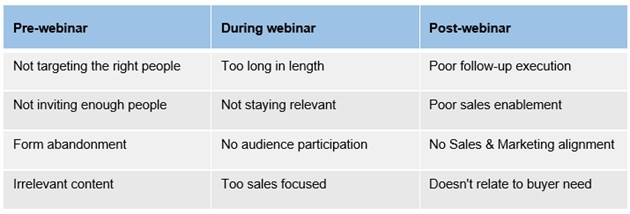Webinars are a great tactic for generating leads, branding, and positioning your company as an industry expert.
With the right strategy in place, webinars can generate high-quality leads and drastically increase revenue.
In fact, 67% of buyers attend webinars when researching B2B purchases; moreover, webinars rank in the top three content formats, and they are among the most popular type of content for engaging prospects, according to the 2015 Content Preferences Survey (email required).
Why Do Webinars Fail?
Webinars can fail for various reasons, such as poor segmentation of your database, irrelevant topics, promotion to the wrong audience, and the lack of a follow-up strategy, among others:

Seven Ways You Can Increase Your Webinar Registrants Right Now
1. Identify your buyer personas
To come up with relevant webinar topics, you need to understand your buyer persona profiles. Talk to your sales, finance, and customer success teams and then analyze your data to validate what they have to say about your buyers.
Your sales and customer success teams speak with customers and prospects on a daily basis, so they know buyers' pain points and challenges. It's your job to take those pain points and challenges and turn them into lead generation opportunities.
2. Hold different types of webinars
Change webinar topics around and focus on different types of webinars, depending on the segment you're targeting. For example, thought leadership webinars will help position your organization as an industry leader and generate more interest in your product, eventually leading to higher conversions and more revenue.
You can also position your webinars to show the different ways your product can be used to solve challenges. Your clients might think of your company as a provider of only one product or service, when in fact you can help with much more than that.
3. Promote your webinar
Use insights from your data to target your buyer personas via different channels, such as email, online ads, and social media.
Also draft an email for your sales team to send to their prospects and clients to increase the number of webinar registrants; that's a good opportunity for them to re-engage with a prospect who may have gone cold or to upsell to existing clients.
4. Don't focus on just selling
Unless your webinar is specifically a product demo and you've let your audience know that before they've registered for it, don't focus on just selling. People generally don't register for your webinars to be sold to; they register for tips on how to address their challenges and pain points.
It's OK to tie your product into the webinar, but do so from a thought leadership perspective. Make sure your audience leaves with key takeaways they can apply to their own campaigns or outreach efforts.
5. Make sure your content is relevant to your buyers' needs
Turn insight into action when developing your webinar topics and make sure they're relevant to your different segments. Think about which persona you're targeting and where they are in the buyer's journey. And noted earlier, talk to your sales and customer success teams for topic ideas as well. They're facing customers and prospects on a daily basis, and they can provide valuable insight. Also be sure to keep the webinar short (30-45 minutes) and relevant.
6. Align sales and marketing from start to finish
To run a successful webinar campaign, Sales and Marketing have to be aligned from start to finish. Marketing should be in charge of the logistics and the webinar content itself, but without help from Sales, the campaign will fail. Run topics by the sales team and work with them to put a follow-up plan in place.
7. Have a post-webinar strategy
You can't close business without a follow-up strategy. Don't just send "thank you for attending the webinar" emails. Work with your sales team to determine who should continue to be nurtured.
Send the recording of the webinar to registrants via email and have your business development reps or other members of the sales team follow up via phone.
You can also use account-based marketing in your follow-up plan to increase conversion rates: Use attendees as triggers and call other relevant contacts at the attendees' companies.
Key Takeaways
To increase your webinar registrations, you need to identify and understand your buyer personas to ensure that you're targeting the right people and the topics are relevant. Using insights from your existing data can also help you reach your target audience via different channels. And, finally, having a follow-up process will drive more revenue if there's a plan in place.




